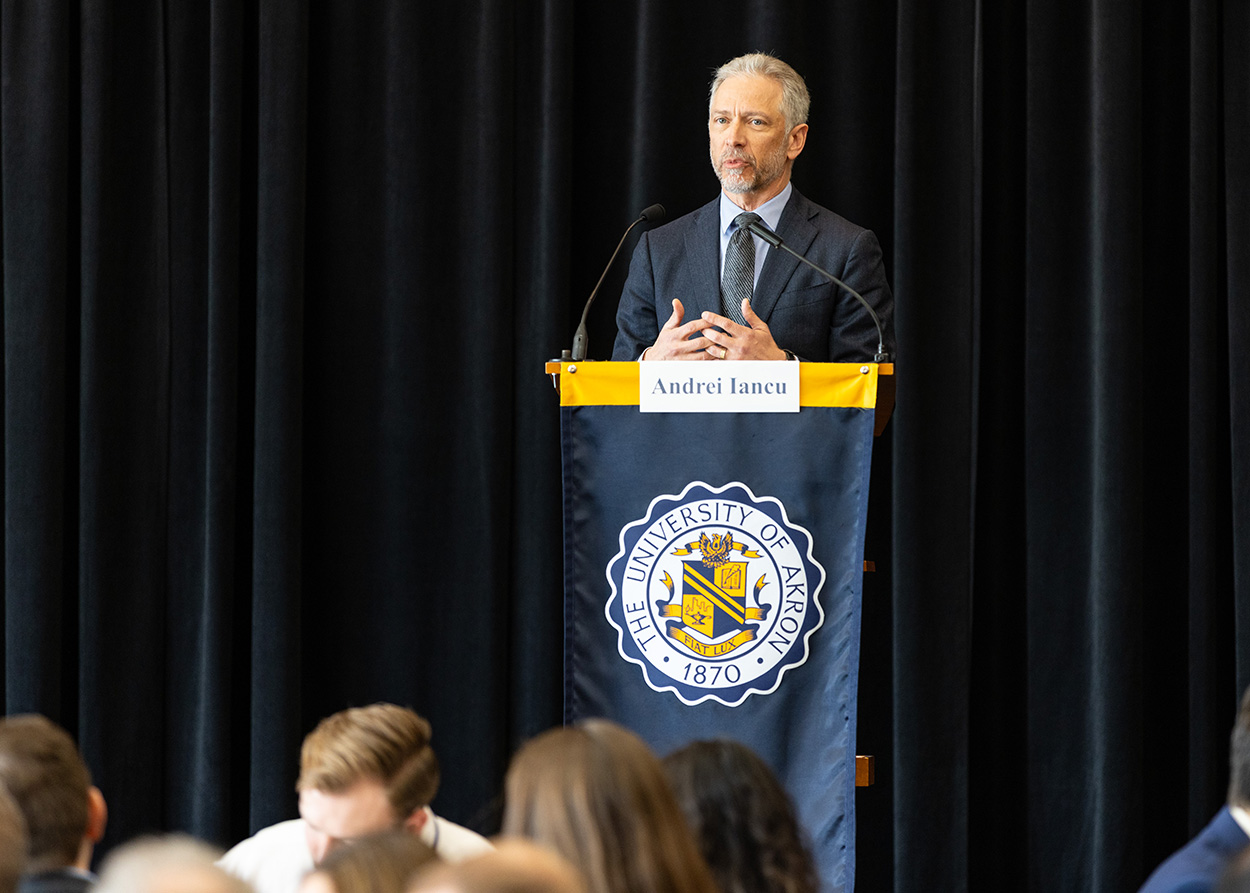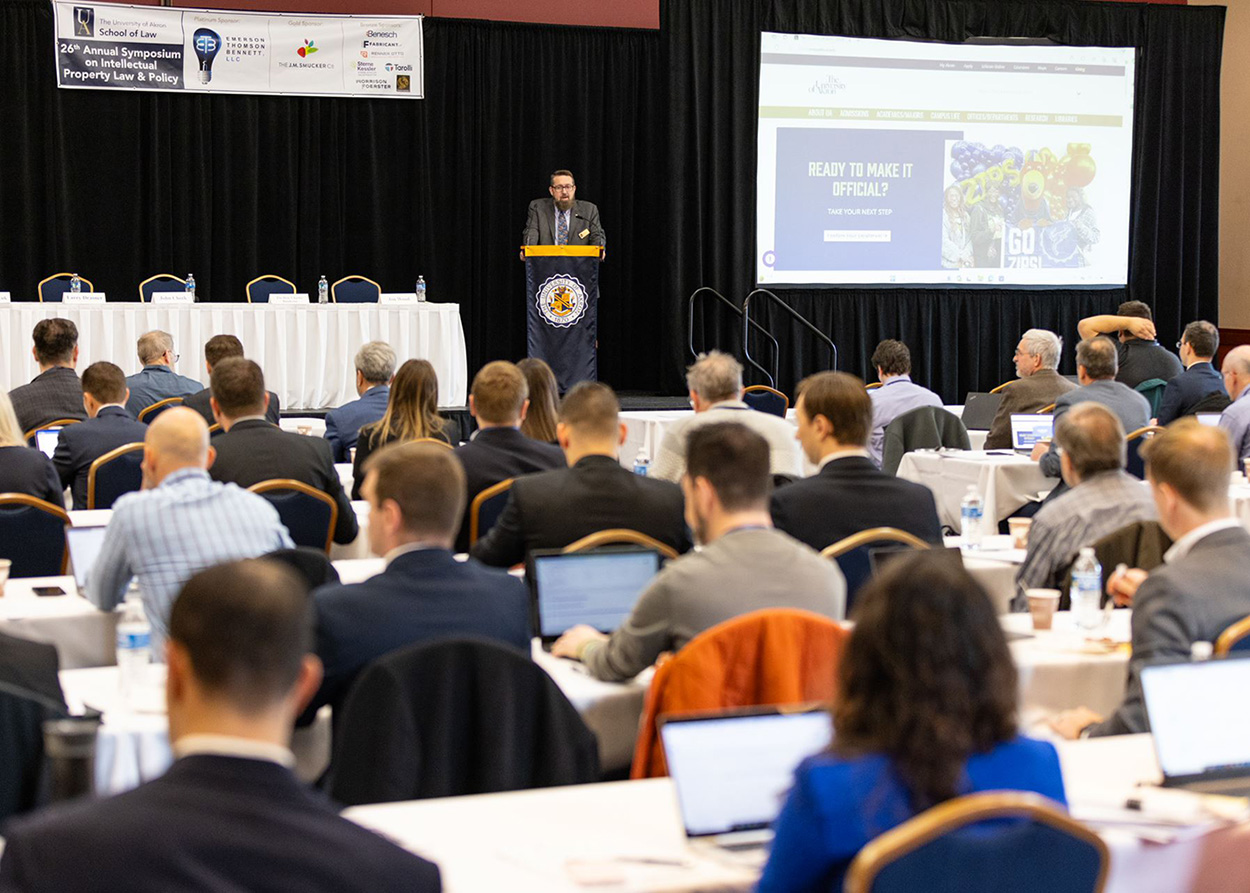Former Patent Office director chides policymakers for IP failings

Andrei Iancu, former director of the U.S. Patent and Trademark Office, was the keynote speaker at the 2024 IP Symposium.
Keynote speaker Andrei Iancu, former director of the U.S. Patent and Trademark Office (USPTO), told the 125 attendees at the 26th annual University of Akron (UA) Symposium on Intellectual Property Law & Policy that a lack of appreciation in Congress for the importance of intellectual property (IP) rights threatens to undermine American innovation.
“Almost everyone recognizes that IP incentivizes innovation by protecting it,” said Iancu, who is now an attorney with Sullivan & Cronwell LLP. “But critically important, it also incentivizes the technology that builds upon the original innovation. It forces dynamic competition. If you don't understand that all these things are inextricably linked, then the whole thing breaks apart. And, unfortunately, that is where we are now.”
As one example, he pointed to efforts to waive intellectual property rights around the world for COVID-19 vaccines.
“They didn't understand that without IP, those vaccines wouldn't have been created in the first place,” he said. “Those investments would've never been made.”
Iancu cited a new assessment from the Council for Innovation Promotion of how effective the U.S. Congress as a whole and its individual members are at nurturing a strong national IP system.
“The biggest discovery is that a supermajority of members—70%—couldn’t care less about IP,” he shared. “They do nothing, pro or con.”
So, while IP-intensive industries make up over 40% of U.S. GDP and 90% of the value of the S&P 500, only a very small percentage of bills introduced and considered over the last three congresses have been pro-IP, he said.
“Frankly, the courts and the PTAB (Patent Trial and Appeal Board) can be excused for having difficulty applying an 18th century statute to 21st century technology,” Iancu said. “As brilliant as those guys were, they still did not anticipate DNA diagnostic testing, artificial intelligence, computer programming and the like. Congress cannot abdicate its responsibilities here.”
Iancu recalled that when he spoke at the UA Symposium five years ago as director of USPTO, he said that the lower courts were interpreting certain Supreme Court decisions too broadly.
“That remains the case today,” he said. “In fact, it's gotten worse since then.”
He pointed to the Supreme Court’s 2022 rejection of an axle-maker’s bid to revive its patent on technology for quieting driveshaft noise because the invention is based on a law of nature and therefore not eligible.
“That decision, in my opinion, is a fundamental failure of understanding of the patent system,” he said. “The whole basis of engineering is for humans to use nature and transform it for practical uses. If you take this to its extreme, nothing would be eligible for a patent.”
In addition to the keynote address, the full-day agenda included panels and speakers on topics including:
- Developing Guidelines for Ethical and Effective Use of AI
- Copyright Small Claims Board Report
- Early Results from the UPC and Considerations for Patent Strategy
- 337 Actions in the ITC
- Best Practices for Protecting Trade Secrets in World Where Non-Competes are Endangered
- Litigation Finance: Pros, Cons and Pitfalls
- Trademarks and Free Speech
“We were delighted to have former USPTO director Iancu at this year’s event along with our other great speakers and panels,” said Professor Mark Schultz, Goodyear Tire & Rubber Company chair in Intellectual Property Law and director of the Intellectual Property and Technology Law program.
“Our purpose in hosting the annual symposium is to provide a high-quality program that attracts IP law practitioners while giving our students the opportunity to learn from and network with them. We definitely achieved that again this year.”

The 2024 IP Symposium attracted a full house of IP practitioners for the all-day program.
Media contact: Cristine Boyd, cboyd@uakron.edu, 330-972-6476
